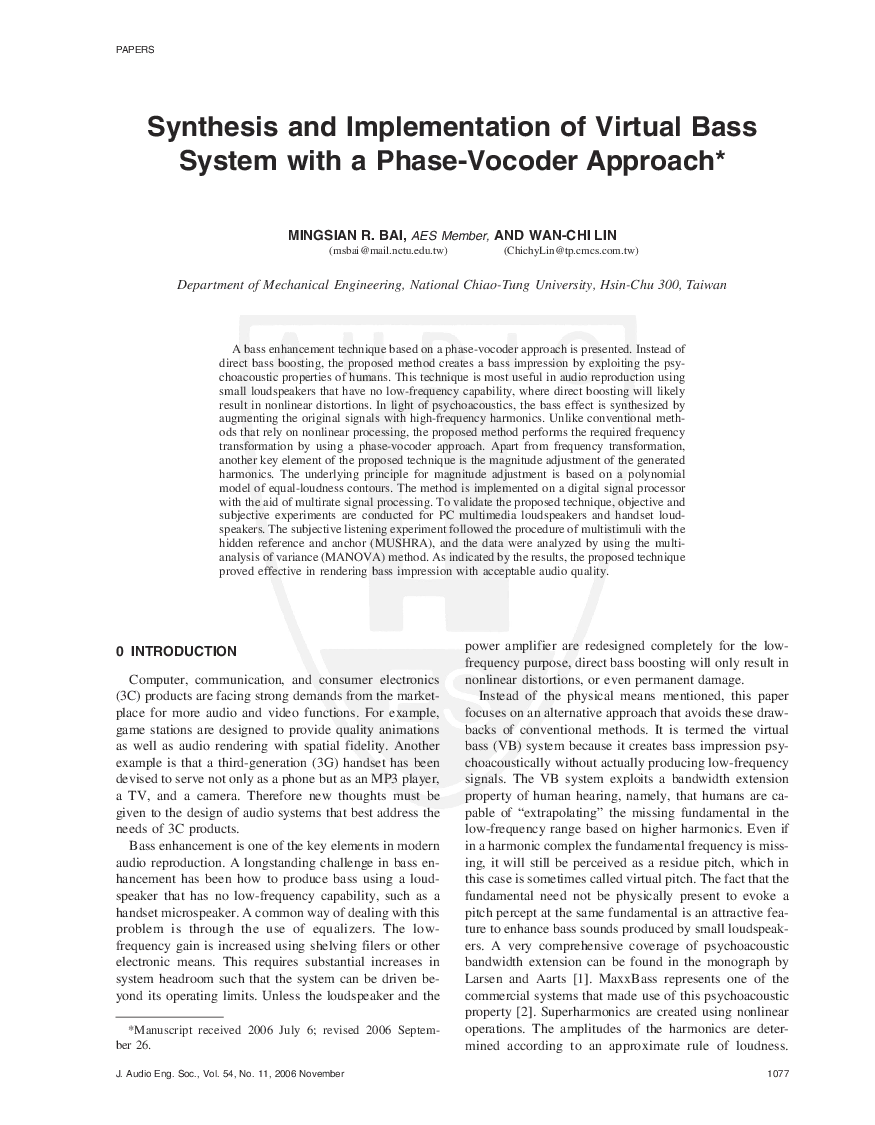Home / Publications / E-library page
You are currently logged in as an
Institutional Subscriber.
If you would like to logout,
please click on the button below.
Home / Publications / E-library page
Only AES members and Institutional Journal Subscribers can download
A bass enhancement technique based on a phase-vocoder approach is presented. Instead of direct bass boosting, the proposed method creates a bass impression by exploiting the psychoacoustic properties of humans. This technique is most useful in audio reproduction using small loudspeakers that have no low-frequency capability, where direct boosting will likely result in nonlinear distortions. In light of psychoacoustics, the bass effect is synthesized by augmenting the original signals with high-frequency harmonics. Unlike conventional methods that rely on nonlinear processing, the proposed method performs the required frequency transformation by using a phase-vocoder approach. Apart from frequency transformation, another key element of the proposed technique is the magnitude adjustment of the generated harmonics. The underlying principle for magnitude adjustment is based on a polynomial model of equal-loudness contours. The method is implemented on a digital signal processor with the aid of multirate signal processing. To validate the proposed technique, objective and subjective experiments are conducted for PC multimedia loudspeakers and handset loudspeakers. The subjective listening experiment followed the procedure of multistimuli with the hidden reference and anchor (MUSHRA), and the data were analyzed by using the multianalysis of variance (MANOVA) method. As indicated by the results, the proposed technique proved effective in rendering bass impression with acceptable audio quality.
Author (s): Bai, Mingsian R.; Lin, Wan-chi
Affiliation:
National Chiao-Tung University, Hsin-Chu, Taiwan
(See document for exact affiliation information.)
Publication Date:
2006-11-06
Import into BibTeX
Permalink: https://aes2.org/publications/elibrary-page/?id=13888
(723KB)
Click to purchase paper as a non-member or login as an AES member. If your company or school subscribes to the E-Library then switch to the institutional version. If you are not an AES member Join the AES. If you need to check your member status, login to the Member Portal.

Bai, Mingsian R.; Lin, Wan-chi; 2006; Synthesis and Implementation of Virtual Bass System with a Phase-Vocoder Approach [PDF]; National Chiao-Tung University, Hsin-Chu, Taiwan; Paper ; Available from: https://aes2.org/publications/elibrary-page/?id=13888
Bai, Mingsian R.; Lin, Wan-chi; Synthesis and Implementation of Virtual Bass System with a Phase-Vocoder Approach [PDF]; National Chiao-Tung University, Hsin-Chu, Taiwan; Paper ; 2006 Available: https://aes2.org/publications/elibrary-page/?id=13888
@article{bai2006synthesis,
author={bai mingsian r. and lin wan-chi},
journal={journal of the audio engineering society},
title={synthesis and implementation of virtual bass system with a phase-vocoder approach},
year={2006},
volume={54},
issue={11},
pages={1077-1091},
month={november},}